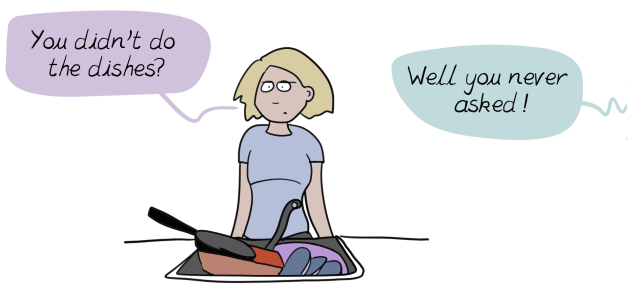
No Really, You Should’ve Asked!
My eyes wide open 2 minutes before my 6AM alarm goes off, and I swear my brain has already been churning out agenda of the day throughout the night – get breakfast ready, get the kids and their lunches ready, client appointments, review client progress notes, call the contractor, sign kids up for swim class, send expense to accountant, donate kids clothes, buy grocery and kids clothes from Costco, turn in kids school forms, talk to that web guy about SEO, make doctor appointment for kids booster shots, fix that scheduling bug on my website, get a sitter for Saturday night thingy, dinner, screw dinner, etc.
“Ok, it’s 5:58 AM! Wakey wakey,” says my brain. I turn around to see my snoring husband, I give him a stink eye and mutter, “You have no idea what I am going through!”
This is what feminists called, “mental load”. It is when a woman keeps mental track of all these things she has to do, the tasks that men do not think about and anticipate, and therefore do not help with unless they are being asked. This creates stress for many women, and tension for many couples. French comic artist Emma succinctly illustrated how women bear this “mental load” and that men should be more in tuned with women’s needs in her post “You Should Have Asked”.
I Agree To Disagree
In Emma’s comic, the wife is busy feeding kids and food boils over. The husband said, “you should’ve asked”. Emma stresses that men need to anticipate the household needs and women shouldn’t have to ask because when a woman asks, it puts her as manager and the man as subordinate. While I find Emma’s comic entertaining, I do not agree with that message.
I agree that men should not be passive bystanders when it comes to shared duties, but I don’t think men should anticipate all the needs without women communicating because some tasks are very obvious that the women need help and some are not obvious at all.
Once, I put all the clean clothes in a hamper and placed it near my husband’s side of the bed without instructions. He knew those are clean because he participated in the folding and yet he did nothing. After 3 days I asked him why he didn’t put the clean clothes away. He said he would have if I had asked. I asked why he needed me to ask and he simply said, “I don’t know what your plan is. Maybe you are putting the winter clothes away; maybe you plan to donate some of them. I can’t read your mind.” I then asked him, “Couldn’t you ask me what I want to do with it?” He replied, “I could. I suppose we both can step it up on this communication game when things are not so cut and dry.”
Touché.
Things Aren’t So Obvious
In the case of Emma’s comic, there’s no way for the husband to know if she is intending for the pot to boil until it’s too late. Only obvious or routine needs can be anticipated. If the family is leaving the house and he notices something is boiling on the stove, it makes sense for him to turn off the stove without asking. That’s obvious because it’s basic safety.
If Tuesday night is garbage day and she is not home in time to take care of it, it makes sense for him to take out the garbage without prompt because garbage day is routine and predictable.
For things that are not obvious or routine, two-way communication is essential. We really shouldn’t expect our partners to be mind readers and we need to communicate with each other.
It’s Not The What But The How
Communicating needs does not make one a manager and the other a subordinate but how you communicate those needs sets the tone of roles. If you bark your orders with your arms crossed, it might look like manager-subordinate roles and does not convey equilateral relationship. In communications, it’s not what you communicate but it’s how you communicate, verbally and non-verbally. There’s are always effective ways to communicate your needs without leaving a sour taste in everyone’s mouth.
If she finds a pile of dishes in the sink that she wishes he had done, she has three options: 1) yell at him about why he hasn’t done the dishes; 2) begrudgingly do the dishes while building resentment; 3) ask him to do the dishes while you do the things you intended on doing if he had done the dishes, and ask him to do it next time if he is the first on the scene of the dirty dishes. Some communications, verbal, text, even a post-it note is better than no communication. Chances are he will need to be reminded a few times before he makes this into a habit but it might be a better option than 1 and 2.
In the case of the husband in Emma’s comic, he could use a better communication tactic as well. Instead of asking his wife, “What did you do?” in an accusatory tone when the pot boiled over which aggravated his wife, he could say, “What happened? How can I help?” Remember, it’s not what you communicate, it’s how you communicate.
It’s 6:01 AM, my therapist brain finally wakes up. I look at my snoring husband again and remind myself that I shouldn’t expect him to be a mind reader. I walk over to his side, gave him a gentle kiss, and put a hamper of fresh clean clothes on the floor next to him with a note “Please put us away”, and go about my day.
Mabel Yiu is a Marriage and Family Therapist specializing in girls’ and women’s mental health at the Women’s Therapy Institute in Palo Alto, CA. You can reach her at mabel@womenstherapyinstitute.com for more tips or tools, or schedule an online appointment.
Image Source: Emma
